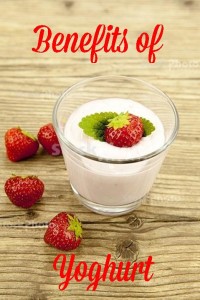 Every late afternoon at around 3:30pm I feed the dogs and Nicky has his yoghurt. It’s been a tradition for some time, so much so that as soon as he hears me dishing up those pellets he says “Yogi!” I’ve always known that yoghurt is a healthy snack but I’ve never really looked much further into it. There are undoubtedly many benefits of yoghurt, and there’s also a lot more to the snacking habits of South Africans too (we only have yoghurt once a week, as opposed to other European countries who have it every day). I think as parents we have a responsibility to instill healthy habits in our children and yoghurt is one of the ways we can start.
Every late afternoon at around 3:30pm I feed the dogs and Nicky has his yoghurt. It’s been a tradition for some time, so much so that as soon as he hears me dishing up those pellets he says “Yogi!” I’ve always known that yoghurt is a healthy snack but I’ve never really looked much further into it. There are undoubtedly many benefits of yoghurt, and there’s also a lot more to the snacking habits of South Africans too (we only have yoghurt once a week, as opposed to other European countries who have it every day). I think as parents we have a responsibility to instill healthy habits in our children and yoghurt is one of the ways we can start.
So what are the benefits of yoghurt?
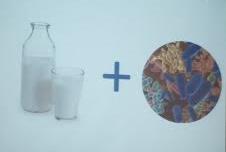 Aids Digestion. Yoghurt basically consists of milk plus a culture of two friendly bacteria Lactobacillus bulgaricus and Streptococcus thermophilus, which convert pasteurized milk to yogurt during fermentation. These bacteria benefit your digestion system.
Aids Digestion. Yoghurt basically consists of milk plus a culture of two friendly bacteria Lactobacillus bulgaricus and Streptococcus thermophilus, which convert pasteurized milk to yogurt during fermentation. These bacteria benefit your digestion system.- Lactose Intolerance Help: On that note, these two bacteria secrete an enzyme called Galactosidase that allows them to pre-digest part of the lactose (the sugar in milk). This is why, generally, people with lactose intolerance will easily digest yogurt.
- Protein: Not only are dairy proteins complete and fully absorbed by your body, they also provide essential amino acids that your body cannot produce itself and must obtain through food. One serving of regular yogurt provides an average of 4g of protein, representing 7 percent of recommended daily intake if you’re a man and 9 percent if you’re a woman. Protein is also good for getting kids to sleep!
- Vitamins: Vitamins A, B, D & E. are contained in NutriDay yoghurt.
- Calcium. Dairy is a great source of this mineral.
- Part of a balanced diet: The SA dept of health recommends that some form of dairy be eaten every day (milk/ yoghurt/maas)
- Good balancer for when you’re on antibiotics: This is just from my personal experience, but whenever I’ve been sick and the doctor has prescribed antibiotics, the pharmacist always recommends some yoghurt to balance out the side effects of the medicine.
- Great for toddlers learning to eat: When I was trying to get Nicky to eat solid food properly at about ten months or so, yoghurt was the one thing I could depend on for him to eat. I think that’s why he still likes it so much, because we’ve had it around for long time. (Don’t try yoghurt before six months, although there is a lot of info out there – some say even later, like nine months)
I’m sure there are more benefits of yoghurt out there (and I’d be keen to hear more in the comments if you think I’ve left some out).
Danone is the company that industrialised the production of yoghurt. It was founded by Isaac Carasso in Barcelona in 1919. He named the brand after his son (“little Daniel”). Isaac was particularly interested in treating children with intestinal disorders. Doctors in Barcelona prescribed yoghurt for their patients because they were aware of research into lactic ferments by Nobel laureate and Pasteur Institute director Elie Metchnikoff. Danone is 95 years old and currently has 45% of the yoghurt market in South Africa: NutriDay is the number one brand.

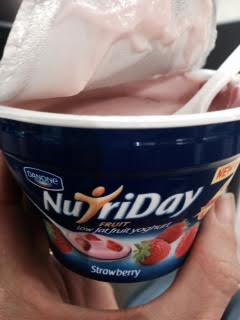 Danone has rolled out a new set of yoghurts and you can now buy the new recipe and sizes – 150g, 270g & 600g. I think what’s nice about them is that they are a bit bigger than the traditional set of six or eight – so you can have a larger portion for a bigger snack. There is also a half size rather than the full kilogram pack – good for sharing with a friend. The yoghurt is thicker and more tasty: trust me, I’ve tasted it!
Danone has rolled out a new set of yoghurts and you can now buy the new recipe and sizes – 150g, 270g & 600g. I think what’s nice about them is that they are a bit bigger than the traditional set of six or eight – so you can have a larger portion for a bigger snack. There is also a half size rather than the full kilogram pack – good for sharing with a friend. The yoghurt is thicker and more tasty: trust me, I’ve tasted it!
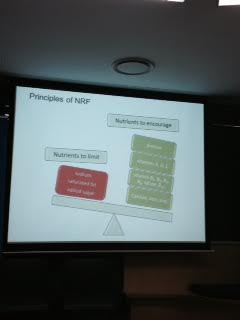 Something interesting about this launch: one of the speakers was Tertia van Zyl, who, together with Marina Visser, conducted a study of South Africa’s snacking habits. They assessed 120 South African snack foods using the NRF (Nutrient Rich Foods) index. Tertia wants to see a holistic score for food so that moms can make an informed decision about what to buy – and also to include the cost factor.
Something interesting about this launch: one of the speakers was Tertia van Zyl, who, together with Marina Visser, conducted a study of South Africa’s snacking habits. They assessed 120 South African snack foods using the NRF (Nutrient Rich Foods) index. Tertia wants to see a holistic score for food so that moms can make an informed decision about what to buy – and also to include the cost factor.
We want to look for nutrient rich, low energy snacks to feed our kids. Fruit and vegetables are the absolute winner here, but not far behind are meat and milk products e.g yoghurt.
We want to avoid sodium, saturated fat and sugar. Rather encourage protein, vitamins A, D, E, a range of Bs and calcium, iron and zinc. (see diagram on the left)
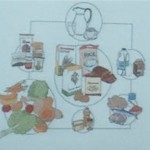 It’s a good idea to stick to the basic food groups: milk and dairy, fats and oils, vegetables and fruit, legumes, meat, fish and eggs, and starchy foods (see picture on the right).
It’s a good idea to stick to the basic food groups: milk and dairy, fats and oils, vegetables and fruit, legumes, meat, fish and eggs, and starchy foods (see picture on the right).
A key message from this research is that one can substitute less healthy snacks with healthy ones like a cup of yoghurt, or fruit – a simple step to improving your child’s health.
Thank you for an informative post Heather. I only ever eat yoghurt when I’m sick and drink antibiotics. Certainly never knew about #1 & 3. Will make a point of eating some more 🙂
I find it a great lunch box treat – be it small drinking yogurts or ones to eat. I wish someone else apart from Woolworths will make a small snack size drinking yogurt though.
yes Nicky loves those drinking yoghurts!
I’m glad my family is addicted to yoghurt. Kitana was so happy yesterday. Hope you and Nicky are well.
Love love love yoghurt and I’ve included in my K’s diet. And her favourite is plain. I tried giving her sweetened version and she just couldn’t understand the taste. Sadly we can only have lactose free yoghurt which for how I only find in woolies and is low fat. I wish someone will make a full fat version.